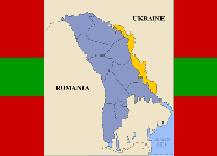 On Thursday, at least eight people were killed in an explosion in Tiraspol, the capital of Transnistria, a breakaway region of Moldova, BBC reports. Local authorities believe the blast, hitting a city minibus in early morning, might have been caused by a bomb, triggered by accidence. If so, this only adds to the picture of Transnistria as a region tarnished by violence and criminality.
On Thursday, at least eight people were killed in an explosion in Tiraspol, the capital of Transnistria, a breakaway region of Moldova, BBC reports. Local authorities believe the blast, hitting a city minibus in early morning, might have been caused by a bomb, triggered by accidence. If so, this only adds to the picture of Transnistria as a region tarnished by violence and criminality.Transnistria constitutes an ignored and absurd anachronism in contemporary Europe. It is still, officially, a part of Moldova, although the region de facto seceded as early as in 1990. Then Transnistria declared independence with assistance of the Russian 14th Army, making its commander, Aleksandr Lebed, a folk hero in Russia. This was followed by low intensity warfare, until a ceasefire was reached in 1992, putting an end to hostilities. Since then, the Transnistrian question is considered a frozen conflict by the international community.
During its roughly 15 years of independence, Transnistria has become a centre of organised crime and trafficking in people, drugs, alcohol, tobacco, weapons and whatever contraband one might imagine. The region is led by Igor Smirnov, who won a landslide victory in the 2001 presidential elections - even to the extent that he reportedly gained over 100% of votes in some districts. Smirnov's eldest son runs Sheriff, one of Transnistria's biggest and most lucrative businesses. As the dedicated football fan he is, he has founded his own professional football team and constructed an international standard football stadium in the capital of Tiraspol - a city numbering a mere 150,000 inhabitants. Such extravagance contrasts to the average income of some 100 USD a month for Transnistrians, which is roughly half that of Moldova - Europe's poorest country.
For long, Transnistria has been able to go about its business relatively undisturbed, not least because of massive backing from Moscow. In 1999, Russia however agreed to withdraw its troops from the region by the OSCE-negotiated Istanbul agreement. To this day, Russia remains reluctant to honour these commitments. During the last year, the tide all the same seems to have turned for Transnistria.
One of the key factors of Transnistrian subsistence has been smuggling. For this, the region was dependent on Kuchma's Ukraine turning a blind eye to such activities, especially as the Ukrainian port of Odessa served as a great outlet of contraband. Since the Orange Revolution, Ukraine has - with international assistance - made great efforts to curve smuggling, why the Transnistrian regime may slowly be approaching the brink of ruin. Also, in December 2005, the EU launched a monitoring mission to supervise the border between Transnistria and Ukraine.
This was followed in March 2006 by Ukraine imposing new customs regulations, demanding all imports from Transnistria to be processed by Moldovan authorities. The new regulations were an effect of the enforcement of a joint customs protocol between Ukraine and Moldova. In effect, this constituted a Ukrainian-Moldovan economic blockade, which both Transnistria and Russia were quick to point out. However, from an international law perspective, Ukraine and Moldova were in the right for the simple reason that Transnistria is still regarded part of Moldova by the international community.
As things now stand, the Transnistrian economy increasingly seems to lose out on its incomes from smuggling. This puts the very existence of Transnistrian independence in peril, which in the end might trigger the change that is so long overdue. It remains to be seen whether Russia will accept such change or if the country will step in to support the breakaway region to avoid yet another coloured revolution in its sphere of vital interests. Until then, Transnistria tragically remains an Absurdistan of Europe.




No comments:
Post a Comment